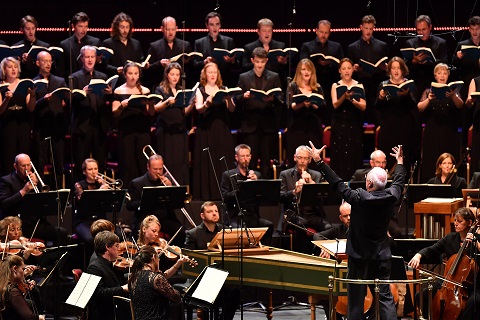Christie conducted the Choir of the Enlightenment and the Orchestra of the
Age of Enlightenment in Handel’s original 1739 version of the oratorio,
which includes the rarely performed Part One which is essentially ‘The Ways
of Zion do mourn’, his Funeral Anthem for Queen Caroline, with new words,
and the soloists were all drawn from the ranks of the professional singers
in the choir (in Handel’s day the soloists also sang in the choral
movements), here they were Zoe Brookshaw, Rowan Pierce, Christopher Lowrey,
Jeremy Budd, Dingle Yandell and Callum Thorpe.
Whilst today we think of the chorus as the mainstay of Handelian oratorio,
in Handel’s day this was not so and his audience rather expected a dramatic
work with lots of solos. This meant that both Israel in Egypt and Messiah
failed to please when first presented to the London audience. Messiah
eventually did take, but Handel adapted Israel in Egypt very early
on by dropping the original part one and adding lots of extra solos. The
original Part One (now 'The Lamentation of the Israelites for the death of
Joseph') does indeed make a tricky opening to the work as the piece has
such a sober intensity about it, and it is a profoundly satisfying work in
its own right.
William Christie used rather larger forces than usual, reflecting the wide
open spaces of the Royal Albert Hall, with a choir of 49 and an orchestra
of 42.
Part One started with a drum beat before the sober symphony. The whole was
a remarkable piece of concentrated and intense choral drama. The singers
giving us fine sculptural phrases and lovely control. There were moments of
drama, and some of quietly hushed intensity, but the overall feel was of
the sober sweep of the piece. This was supported by the fine singing, and
characterful support from the orchestra. In whatever guise, this is
remarkable music and Christie and his performers ensured that it made the
maximum effect.
As Handel probably intended, Part Two was a complete change in mood. The
choral singers clearly enjoyed the various challenges which Handel gave
them in depicting the different plagues. Choruses like 'He spake the word'
were not only full of vivid contrasts, but the singers really relished the
words like 'flies' and 'lice', whilst 'He sent thick darkness' as very
atmospheric, all ending with a wonderfully expansive 'And Israel saw'.
Whilst Christie's speed were not excessive, some passages went a quite a
pace so that we had some vividly virtuoso choral singing. The solos were
similarly characterful with Christopher Lowrey singing with lovely tone,
and again relishing the 'frogs', 'blotches and blains'. We also had one of
Handel's extra solos which he introduced, 'Through the and so lovely
blooming', which was originally from ‘Athalia’. This was rather pastoral
and though finely sung by Rowan Pierce, with a lovely clear focussed
soprano, it did rather sit oddly in amongst the plagues.
In Part Three, grandeur and rich choral sound gradually gave way to some
vivid word-painting, as the chorus described the vicissitudes of Pharaoh's
army, with choruses like 'Thy right hand' full of colour. The final chorus
was taken at quite a pace, so that the Lord's triumph was not only glorious
but full of virtuoso choral singing. The solos and duets were similarly
characterful, with Zoe Brookshaw and Rowan Pierce providing to lovely clear
firm, yet contrasting voices, in 'The Lord is my strength', whilst Dingle
Yandell and Callum Thorpe were similarly terrific in 'The Lord is a man of
war' giving us two admirably firm and lithe voices. Jeremy Budd made the
various recitatives count, whilst giving us a vivid account of 'The enemy
said, I will pursue', taken at quite a tempo. Budd and Lowery provided to
lovely intertwining voices in the duet 'Thou in thy mercy'.
I am not sure that the original version of Israel in Egypt will ever become
common currency. Though tastes have changed since Handel's day, the large
scale, sober lamentation of Part One seems to unbalance the whole. But this
was a wonderful opportunity to hear it, with some of the finest choral
singing I have heard in a long time, supported by strongly characterful
playing, full of crisp detail and elegant line.
The concert is available for 30 days on the BBC iPlayer.
Robert Hugill
Handel: Israel in Egypt (original three-part 1739 version)
Zoe Brookshaw, Rowan Pierce, Christopher Lowrey, Jeremy Budd, Dingle
Yandell, Callum Thorpe, Choir of the Enlightenment, Orchestra of the Age of
the Enlightenment, William Christie (conductor)
BBC Proms at the Royal Albert Hall; Prom 2
